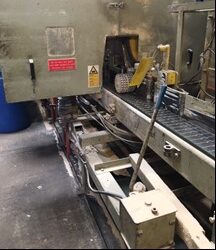Company fined after worker traps arm in machine
Nestlé UK Ltd was sentenced for breaching health and safety regulations after an employee was dragged into a machine on the production line of their Albion Mills site in Halifax.
Bradford Crown Court heard how on 13 February 2016, while observing the operation of the After Eight production machine, the technical operator placed his right hand close to a gap in the machine housing. An emery cloth held in his right hand was dragged into the machine taking his arm with it.
The employee was unable to reach any of the emergency stop buttons located around the machine from the position in which he was trapped. He had to be released from the machine by paramedics. He suffered a double compound fracture to his arm, which required surgery.
An investigation by the Health and Safety Executive (HSE) found the company had failed to prevent access to dangerous moving parts of the machine, namely an ‘in-running nip’. There was a gap large enough to allow access at a belt conveyor entry on the After Eight line.
Nestle UK Ltd of City Place Gatwick pleaded guilty to breaching Reg 11 of the Provision and Use of Work Equipment Regulations 1998.They were fined £640,000 and ordered to pay £26,234 in costs.
Speaking after the hearing, HSE inspector Jacqueline Ferguson said: “This is a tragic incident that could so easily have been avoided. The risks inherent in failures to properly guard dangerous parts of machinery are well known in industry and to Nestlé.
“Companies should be aware that HSE will not hesitate to take appropriate enforcement action against those that fall below the required standards.”
Notes to Editors:
1. The Health and Safety Executive (HSE) is Britain’s national regulator for workplace health and safety. We prevent work-related death, injury and ill health through regulatory actions that range from influencing behaviours across whole industry sectors through to targeted interventions on individual businesses. These activities are supported by globally recognised scientific expertise. www.hse.gov.uk
2. More about the legislation referred to in this case can be found at: www.legislation.gov.uk/
3. HSE news releases are available at http://press.hse.gov.uk
The post Company fined after worker traps arm in machine appeared first on HSE Media Centre.
